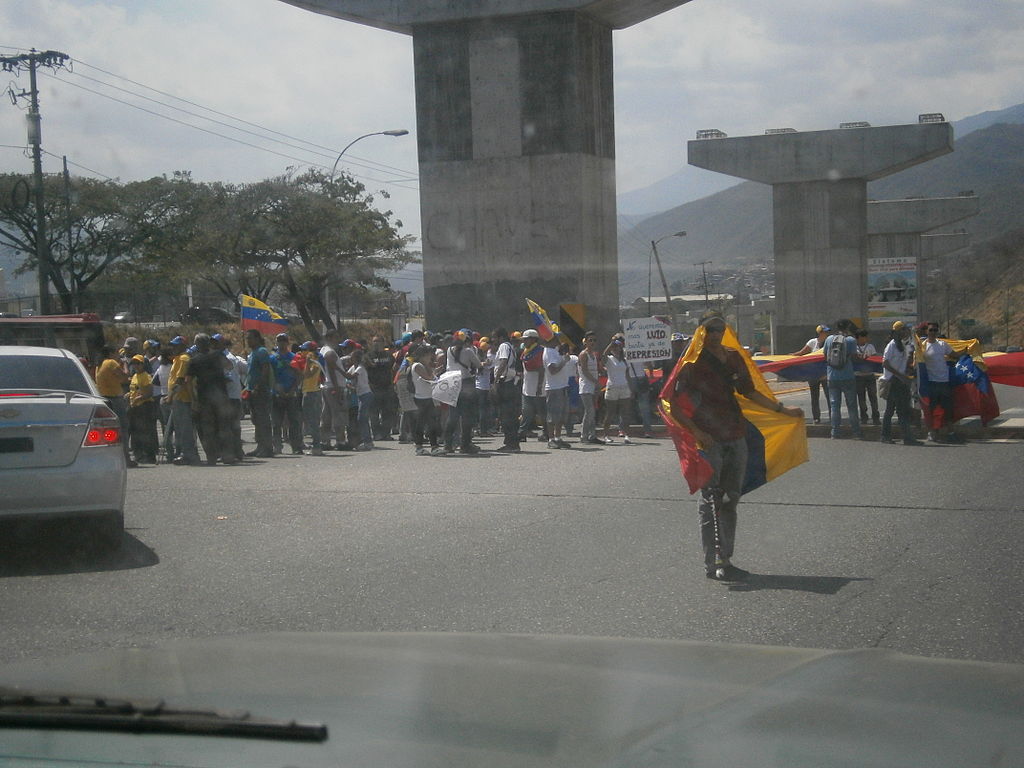Every day, around 25,000 Venezuelans cross the border, fleeing the economic and political instability of their home country.[1] Jeferson José Gutierres is a Venezuelan who lives with his wife and three children under the stone “C” of a sculpture in the center of the border city, Cucúta, Colombia. The Gutierres family fled instability in Venezuela, where triple-digit inflation has rendered their savings useless in neighboring Colombia, forcing their homelessness. Yet, Gutierres insists that life in Colombia is better, and he will only “return [to Venezuela] when Maduro goes.”[2]
Venezuela’s descent into fragility is not only an issue for Venezuelans. Fragile states destabilize neighboring countries, including Colombia, which has only recently established tenuous peace with the FARC rebel group after a long civil war. If Venezuela continues to deteriorate, non-state actors in the region like the FARC or powerful cartels would be able to establish themselves within the country. Additionally, as the second largest oil exporter in the Western Hemisphere, Venezuela’s fragility is dangerous for those who depend on Venezuelan oil imports to fuel their economies (the three largest markets being China, India, and the United States), giving the crisis a global impact.[3][4]
The roots of this crisis reach back to 1999, when Hugo Chávez was elected president. Chávez rejected the neoliberal model of constrained government regulation around the economy. As a socialist, he believed that neoliberalism had been introduced by a capitalist United States in order to exploit Venezuelan natural resources.[5] Chávez nationalized Venezuelan oil, steel, and telecommunications industries, greatly involving the government in its economy. Chávez called this hybrid of capitalism and Soviet socialism “21st century socialism.”[6]
After Chávez’s death, Maduro (his successor within the Socialist party) assumed power. During that time, the international oil market was collapsing due to a variety of factors: The United States had greatly reduced its oil imports, the world was shifting toward alternative energy sources, and several countries were still recovering from the great recession of the late 2000s, reducing oil demand. This was catastrophic for Venezuela, as 95 percent of its total export revenue comes from oil. Without oil revenue, the government could not support the massive social safety net it had constructed.[7] As the welfare system collapsed, tens of thousands of Venezuelans took to the street to protest Maduro, who unleashed the military and police in order to quell the protests, killing over 130 people in the months of April and July of 2017.[8] Maduro did not stop with the protesters, also cracking down on his opposition, whose leader, Antonio Ledezma of the Allianza Bravo Pueblo (Fearless People’s Alliance), recently escaped house arrest and fled to Colombia.[9]
The inability to deliver promised government services, coupled with the use of violence against its own citizens, significantly decreased the internal legitimacy of the Maduro government. The chain reaction sparked by Venezuela’s economic failures has caused serious societal instability due to government mismanagement of the situation.
Today, the economy is in shambles, and the government is in turmoil. After the opposition party won a majority, President Nicolás Maduro consolidated power for himself in an anti-democratic move, stripping the National Congress of its legislative capacity and triggering massive countrywide protests.[10] Maduro’s insistence on retaining power has only served to further exacerbate tensions, adding a political component to what had previously been a solely economic crisis.
To stabilize its economy, Venezuela must identify an economic strategy for decreasing inflation and rebuilding with the goal of long-term prosperity. Neoliberalism and dependency theory are two established theories that provide blueprints for restructuring a failing economy. Taking into account the history and current global standing of Venezuela, however, it is dependency theory that provides a superior avenue to sustainable success. However, neoliberalism cannot be completely discounted, as it also outlines necessary steps for economic resuscitation.
In order to bring wealth into Venezuela, neoliberal economists would immediately open it up to foreign investment, while simultaneously cutting down on government welfare programs. Liberals believe that with its special interests and biases, government only hampers or unnaturally shapes growth, as opposed to the market, which “generate[s] a new and more efficient modus operandi for economic activity.”[11] Without government interrupting the economy and protecting local businesses, foreign investors would be more willing to enter a country. Foreign investment allows Venezuela’s abundant natural resources to be used in a way that enriches the country.[12] This process was pioneered in Bolivia in 1985, when economists forced the government into a “clean break” with past fiscal policy, shifting the country almost all the way into laissez-faire economics. At the time, Bolivia’s economy was facing an inflation rate over 24,000 percent per year, and this “shock therapy” stabilized the economy. This prevented Bolivia from spiraling into what would have been an unprecedented economic crisis.[13]
Dependency theorists would dispute these liberal arguments, claiming that by allowing more developed western countries to extract resources from the periphery, this perpetuates the cycle of dependency.[14] Foreign investment could introduce competition and tax dollars into the Venezuelan economy, and privatizing industries that were nationalized under Hugo Chávez would reduce national debt; however, dependency theorists argue that neoliberalism creates a system of labor exploitation that benefits rich countries at the expense of the poor, and opening up an economy is conducive to exploitation rather than growth.[15][16] Adrián Sotelo Valencia, a scholar at the National Autonomous University of Mexico, suggests that liberal policies may also lead to authoritarian regimes in peripheral states. Such developments would hurt workers even more. Under an authoritarian regime, in addition to low wages, workers’ rights can be taken away at any moment.[17]
Dependency theorists argue that even in situations of perceived equality, the larger, more developed (typically Western) country often wins anyway. An example of this would be the North American Free Trade Agreement (NAFTA), where a last-minute push by the United States to change regulations around sugar plantations gave American farmers significant advantages over their Mexican counterparts—a classic example of a more powerful country “winning” the trade deal. This was accomplished by forcing Mexico to adopt stricter agricultural regulations. The enforcement of regulations by the U.S. and Canada completely negated the few advantages still held by the small-scale, impoverished farmers that formed the backbone of the Mexican agricultural industry.[18]
Despite the failures of liberalism, dependency theorists cannot completely reject it. Import substitution industrialization (replacing imported goods with heavily subsidized domestic equivalents) is not an economically viable concept due to problems with obtaining materials and limited market size.[19] Nationalizing industries is also not an effective solution, as it caused Venezuela’s original problems.
Understanding a country’s position in the international system is also important, so each case must be examined independently. S. M. Shafaeddin, an economist at Oxford University, believes in an alternative to neoliberalism that avoids the peril of completely closing off an economy. He stresses the need for development-oriented trade, which protects and promotes growth while simultaneously opening up the economy at a slower pace than the one suggested by neoliberalism.[20] Additionally, foreign direct investment (FDI) should be limited and used “selectively as a tool of industrialization and export expansion.”[21] By slowing the flow of investment, states can control their own growth instead of submitting themselves to the world market.
Sotelo Valencia expands on this alternative by advocating for regionalism—trade agreements (similar to the EU) that place regional affairs above global affairs. A Latin market would be large enough to sustain itself in a way that single countries cannot, avoiding the dangers of import substitution industrialization.[22] Regionalism protects small markets from the more powerful markets that control the global system. This is an alluring prospect to dependency theorists, who wish to keep Venezuela out of the hands of core states like the U.S.[23] Latin America does not have that sort of regional intergovernmental organization in place yet, but it has held important summits between regional heads of state to discuss diplomacy and foreign policy.[24] Dependency theorists would advocate for building stronger regional agreements out of these summits while they rebuild the Venezuelan economy. By strengthening regional bodies instead of immediately joining the international system, Venezuela can work to avoid falling into a cycle of dependency by strengthening regional bodies instead of immediately joining the international system.
If Venezuela cannot find a way out of its crisis, it will continue its devolution into a failed state. The crisis has opened a policy window for economic overhaul, but the policy must be smart. Dependency theory explains the failures of liberalism far better than liberalism itself. When looking to the future, it avoids past mistakes and offers a concrete, measured way forward, easing Venezuela onto the path toward economic strength.
[1] Watson, Katy. “Venezuelans cross into Colombia as crisis deepens.” BBC News. September 28, 2017. Accessed February 11, 2018. http://www.bbc.com/news/world-latin-america-41305735.
[2] Watson, Katy. “Venezuelans cross into Colombia as crisis deepens.” BBC News. September 28, 2017. Accessed February 11, 2018. http://www.bbc.com/news/world-latin-america-41305735.
[3] OEC The Observatory of Economic Complexity, “Venezuela”, [Destinations] 11/21/2017 https://atlas.media.mit.edu/en/profile/country/ven/
[4] “Crude Oil Exports.” The World Factbook. Central Intelligence Agency, 2017. Web. 17 Nov 2017. https://www.cia.gov/library/publications/the-world-factbook/rankorder/2242rank.html
[5] De La Torre, Carlos. “Left-Wing Populism: Inclusion and Authoritarianism in Venezuela, Bolivia, and Ecuador.” Brown Journal of World Affairs, vol. 23, no. 1, Fall/Winter2016, pp. 61-76. EBSCOhost, ezproxy.neu.edu/login?url=http://search.ebscohost.com/login.aspx?direct=true&db=a9h&AN=121623895&site=ehost-live&scope=site.
[6] De La Torre, Carlos. “Left-Wing Populism: Inclusion and Authoritarianism in Venezuela, Bolivia, and Ecuador.” Brown Journal of World Affairs, vol. 23, no. 1, Fall/Winter2016, pp. 61-76. EBSCOhost, ezproxy.neu.edu/login?url=http://search.ebscohost.com/login.aspx?direct=true&db=a9h&AN=121623895&site=ehost-live&scope=site.
[7] Gupta, Girish. “Falling Oil Prices Turn Up The Heat On Venezuela’s Maduro.” Time, Time, 4 Dec. 2014, time.com/3619052/oil-prices-maduro-venezuela/.
[8] “Los Íconos De Las Protestas En Venezuela, Divididos Entre Votar o No En Las Regionales.” La Nacion, La Nacion, 13 Oct. 2017, www.lanacion.com.ar/2072059-los-iconos-de-las-protestas-en-venezuela-divididos-entre-votar-o-no-en-las-legislativas.
[9] Ricaurte, Daniel Armirola. “Ledezma Le Dará Voz Global a La Oposición.” Www.elcolombiano.com, El Colombiano, 18 Nov. 2017, www.elcolombiano.com/internacional/venezuela/ledezma-le-dara-voz-global-a-la-oposicion-FA7714575.
[10] Ricaurte, Daniel Armirola. “Ledezma Le Dará Voz Global a La Oposición.” Www.elcolombiano.com, El Colombiano, 18 Nov. 2017, www.elcolombiano.com/internacional/venezuela/ledezma-le-dara-voz-global-a-la-oposicion-FA7714575.
[11] Leite, Alexandre César Cunha. “Neoliberalism and Reactions to It.” Latin American Research Review, vol. 50, no. 3, July 2015, pp. 264-274. EBSCOhost, ezproxy.neu.edu/login?url=http://search.ebscohost.com/login.aspx?direct=true&db=a9h&AN=110445664&site=ehost-live&scope=site.
[12] Bone, John. “The Deregulation Ethic and the Conscience of Capitalism: How the Neoliberal ‘Free Market’ Model Undermines Rationality and Moral Conduct.” Globalizations, vol. 9, no. 5, Oct. 2012, pp. 651-665. EBSCOhost, doi:10.1080/14747731.2012.732425.
[13] Passell, Peter. “Dr. Jeffrey Sachs, Shock Therapist.” The New York Times Magazine. June 26, 1993. Accessed February 11, 2018. http://www.nytimes.com/1993/06/27/magazine/dr-jeffrey-sachs-shock-therapist.html?pagewanted=all.
[14] Sotelo Valencia, Adrián. “The Currency of Ruy Mauro Marini’s Thinking and Dependency Theory.” [“La Vigencia del Pensamiento de Ruy Mauro Marini y la Teoría de la Dependencia”]. Textos & Contextos, vol. 16, no. 1, jan-jul2017, pp. 9-28. EBSCOhost, doi:10.15448/1677-9509.2017.1.27810.
[15] Goodman, John B., and Gary Loveman. “Does Privatization Serve the Public Interest?” Harvard Business Review, Harvard University, 1 Aug. 2014, hbr.org/1991/11/does-privatization-serve-the-public-interest.
[16] Sotelo Valencia, Adrián. “The Currency of Ruy Mauro Marini’s Thinking and Dependency Theory.” [“La Vigencia del Pensamiento de Ruy Mauro Marini y la Teoría de la Dependencia”]. Textos & Contextos, vol. 16, no. 1, jan-jul2017, pp. 9-28. EBSCOhost, doi:10.15448/1677-9509.2017.1.27810.
[17] Sotelo Valencia, Adrián. “The Currency of Ruy Mauro Marini’s Thinking and Dependency Theory.” [“La Vigencia del Pensamiento de Ruy Mauro Marini y la Teoría de la Dependencia”]. Textos & Contextos, vol. 16, no. 1, jan-jul2017, pp. 9-28. EBSCOhost, doi:10.15448/1677-9509.2017.1.27810.
[18] Leite, Alexandre César Cunha. “Neoliberalism and Reactions to It.” Latin American Research Review, vol. 50, no. 3, July 2015, pp. 264-274. EBSCOhost, ezproxy.neu.edu/login?url=http://search.ebscohost.com/login.aspx?direct=true&db=a9h&AN=110445664&site=ehost-live&scope=site.
[19] Shafaeddin, S. M. “Towards an Alternative Perspective on Trade and Industrial Policies.” Development & Change, vol. 36, no. 6, Nov. 2005, pp. 1143-1162. EBSCOhost, doi:10.1111/j.0012-155X.2005.00453.x.
[20] Shafaeddin, S. M. “Towards an Alternative Perspective on Trade and Industrial Policies.” Development & Change, vol. 36, no. 6, Nov. 2005, pp. 1143-1162. EBSCOhost, doi:10.1111/j.0012-155X.2005.00453.x.
[21] Shafaeddin, S. M. “Towards an Alternative Perspective on Trade and Industrial Policies.” Development & Change, vol. 36, no. 6, Nov. 2005, pp. 1143-1162. EBSCOhost, doi:10.1111/j.0012-155X.2005.00453.x.
[22] Sotelo Valencia, Adrián. “The Currency of Ruy Mauro Marini’s Thinking and Dependency Theory.” [“La Vigencia del Pensamiento de Ruy Mauro Marini y la Teoría de la Dependencia”]. Textos & Contextos, vol. 16, no. 1, jan-jul2017, pp. 9-28. EBSCOhost, doi:10.15448/1677-9509.2017.1.27810.
[23] Quiliconi, Cintia and Raúl Salgado Espinoza. “Latin American Integration: Regionalism À La Carte in a Multipolar World?.” [“Integración latinoamericana: ¿Regionalismo à la Carte en un Mundo multipolar?”]. Colombia Internacional, no. 92, oct-dec2017, pp. 15-41. EBSCOhost, doi:10.7440/colombiaint92.2017.01.
[24] Quiliconi, Cintia and Raúl Salgado Espinoza. “Latin American Integration: Regionalism À La Carte in a Multipolar World?.” [“Integración latinoamericana: ¿Regionalismo à la Carte en un Mundo multipolar?”]. Colombia Internacional, no. 92, oct-dec2017, pp. 15-41. EBSCOhost, doi:10.7440/colombiaint92.2017.01.



